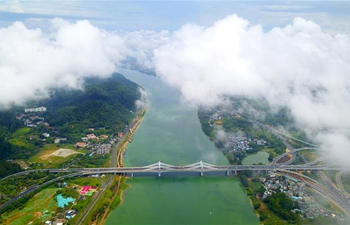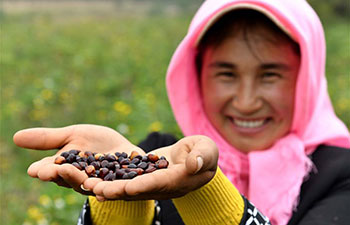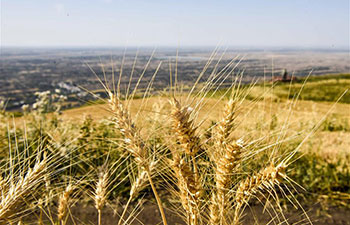by Misbah Saba Malik
ISLAMABAD, Aug. 31 (Xinhua) -- Farmers in Pakistan's Sindh Province may have sleepless nights ahead if their rice crop did not get irrigation water.
The country's weather office said that the province this year received far less rains than usual and may seriously affect the agriculture sector in the province.
Due to low water level in reservoirs, farmers in Sindh and Punjab provinces could not get enough irrigation water for their cotton crop during the first half of this year. Officials from the country's meteorological department predicted that if the country receives good spell of monsoon rains from July to mid-September, things will get under control for the yield, but to their dismay, this year the country received 47 percent less rains than usual.
Sindh and Balochistan were the worst affected provinces with a little or no rain during the current monsoon season, which started on July 1 and lasts till mid September.
Khalid Malik, director of the Pakistan Meteorological Department Islamabad, Told Xinhua that Sindh received less than 87 percent rains than usual whereas rainfall in Balochistan diminished by 53 percent this monsoon season.
According to local media reports, the rice crop was sown very late in parts of Sindh and Punjab as farmers were fighting the drought. In absence of the rains, the crop is feared to dry out.
This year, Sindh could produce 30 percent less cotton than the target set by the government, as many lands could not get water for irrigation and cotton crops could dry out in such areas, according to local reports.
Muhammad Saleem, a farmer in Sindh, told Xinhua that currently the situation is better as monsoon rains had a good spell in Punjab and water level has improved in rivers and canals that pass Sindh, but due to a less number of rains in Sindh, the forthcoming summer crop including wheat, sugarcane and rice will be affected.
Malik said that monsoon rains originates from the Pacific Ocean and this season the sea surface temperature of the ocean was slightly higher than normal and disturbed the monsoon rains cycle.
He accepted that among other theories, it cannot be denied that the current disturbance in the monsoon cycle is the outcome of climate change which is becoming more and more obvious in the country with every coming year.
"In Pakistan, winter rains take place by Western Depression system originating from the Mediterranean, and summer rainfall mainly takes place due to the monsoon. Last winter the Western Depression system was also disturbed resulting in less rainfall and even lesser snowfall on the country's northern peaks, leading to a shrunk volume of water in reservoirs."
The meteorological office director said that when the country receives good monsoon rains, the underground water level increases and the water reservoirs also get filled, but this year the season is almost towards the end and the dams are not filled yet.
He added that the lack of dams in the country also serves as a reason of the current drought as rainwater cannot be saved and the excess water goes wasted in the Arabian Sea. "In the absence of adequate infrastructure to save water, the situation for crops gets even worse if there are not enough rains."
Pakistan is an agriculture economy and about 70 percent of its population is directly or indirectly associated with this sector. According to an economic survey of Pakistan, agriculture contributes 19 percent to the GDP of the country and about 43 percent of the country's labor force is partially or fully associated with it.
Earlier in a conversation with Xinhua, Uzair Qamar, professor of water resources management and engineering in the University of Arid Agriculture Faisalabad, said that the only way to save the country's agriculture is to build reservoirs to save water for irrigation.
He said that Pakistan's biggest water reservoirs, the Tarbela Dam and Mangla dams, are already facing erosion issues and their water storage capacity is likely to reduce by 33 percent by 2020, and in the absence of new dams, the irrigation system of the country will be badly affected.?

















